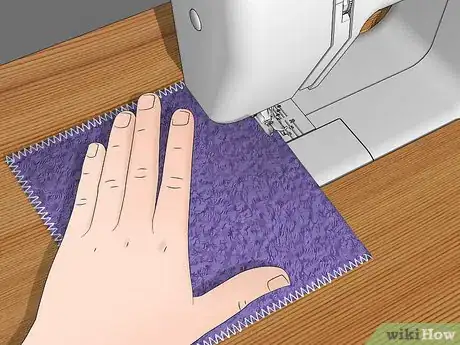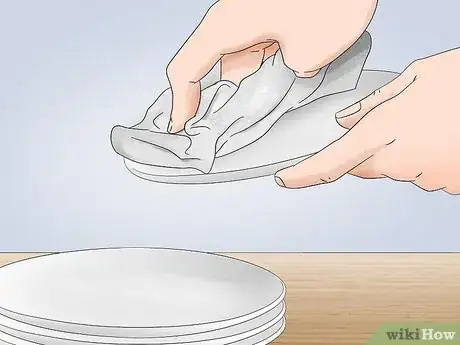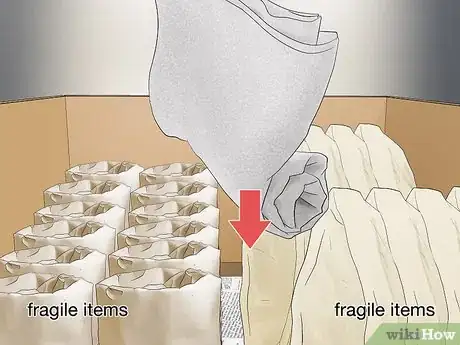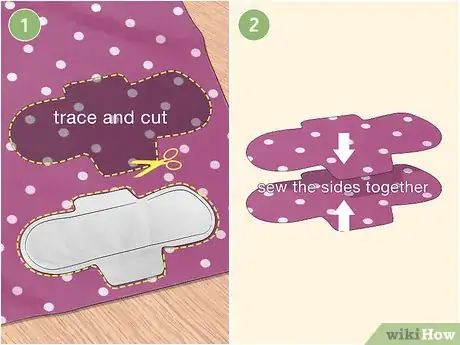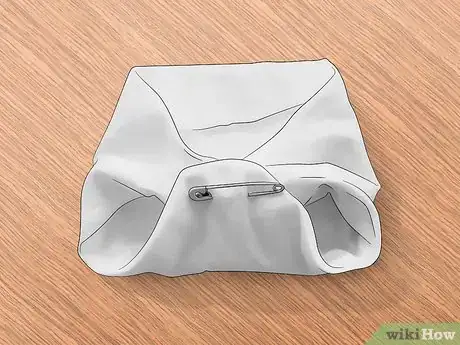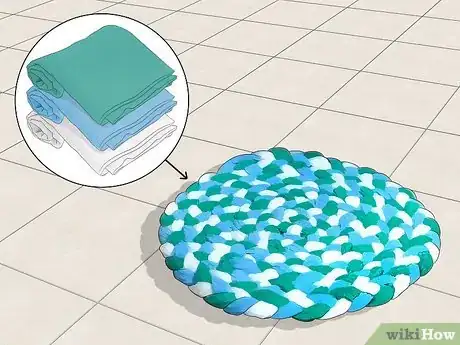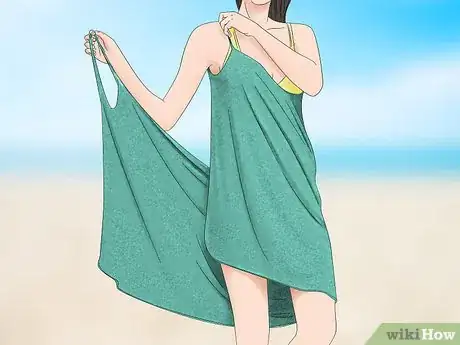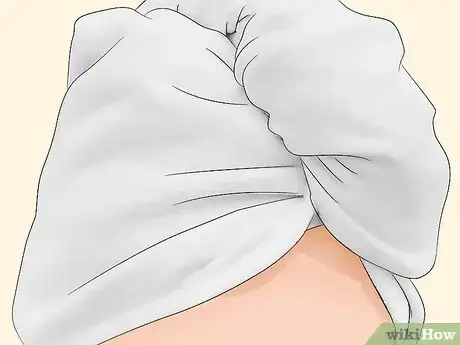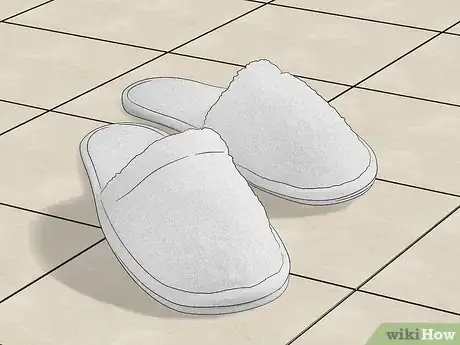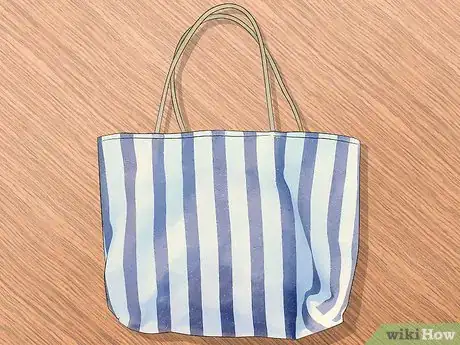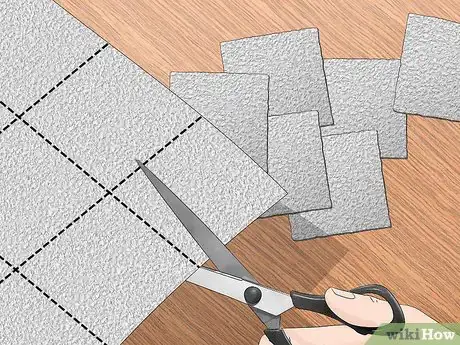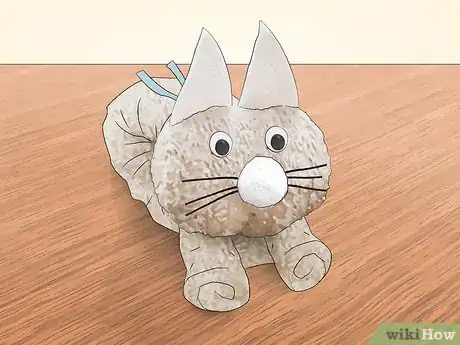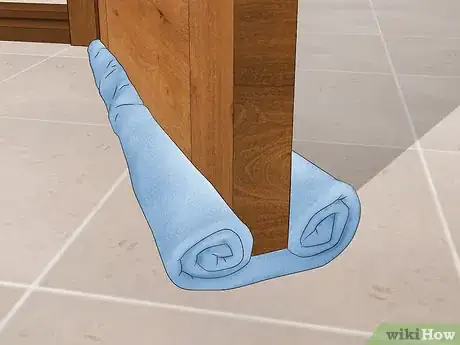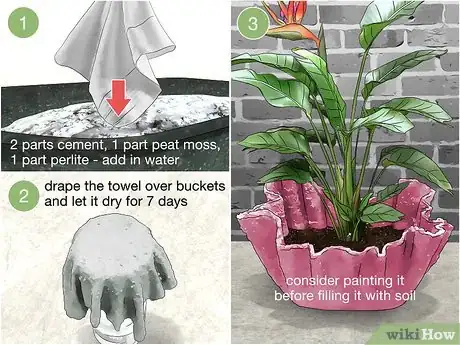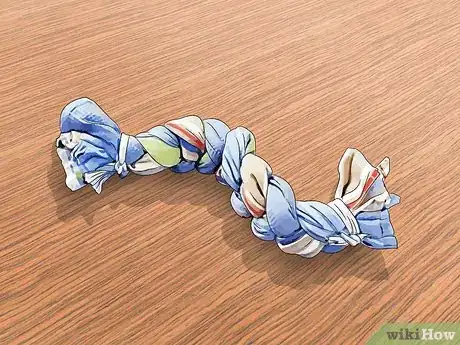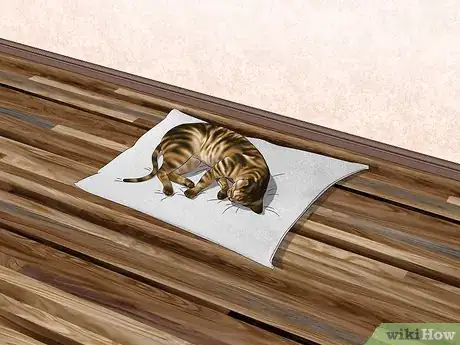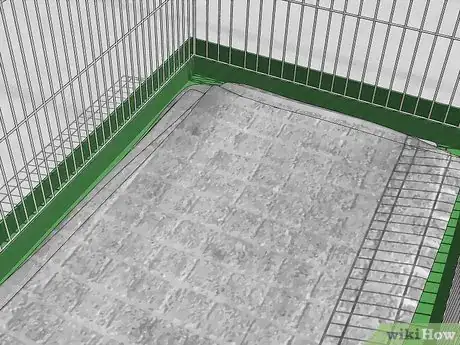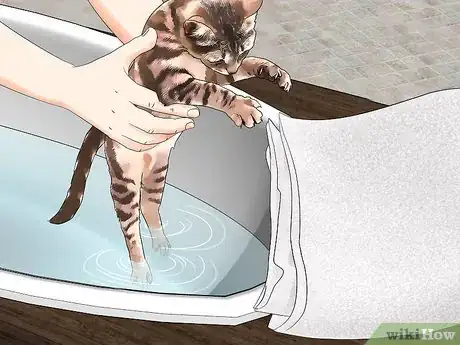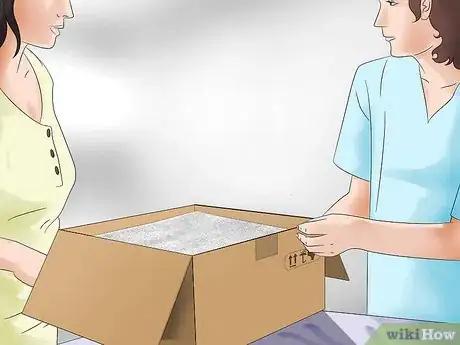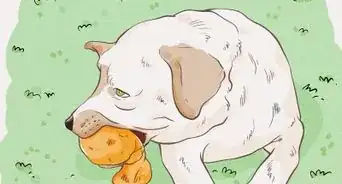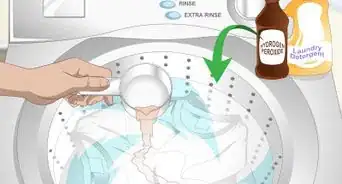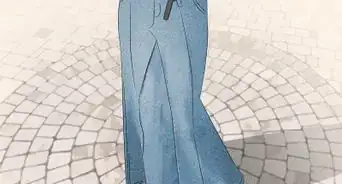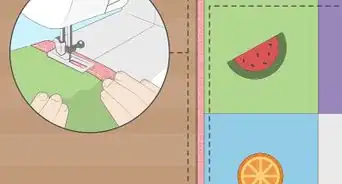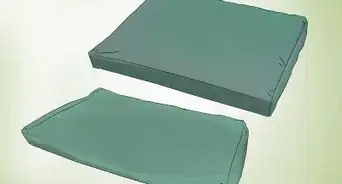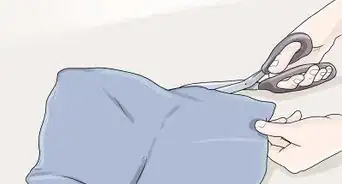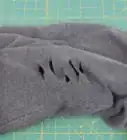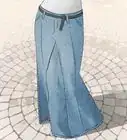This article was co-authored by Natalie Kay Smith. Natalie Kay Smith is a sustainable fashion writer and the owner of Sustainably Chic, a sustainability-focused blog. Natalie has over 5 years of sustainable fashion and green living writing and has worked with over 400 conscious brands all over the world to show readers fashion can exist responsibly and sustainably.
There are 23 references cited in this article, which can be found at the bottom of the page.
This article has been viewed 135,983 times.
Fabric is a great resource, even if it’s a worn-out towel. Old towels have plenty of life left in them, so put them to good use to avoid waste. You could turn old towels into things to use around your house, including mats and clothing. If you don’t need to save the cloth for yourself, cut it up and use for craft projects or for pets. Even if you have to cut away frayed ends, you can get more value out of a repurposed towel than you ever would have expected.
Steps
Repurposing Towels for Household Needs
-
1Repurpose towels into washcloths if they are still absorbent. Store-bought washcloths can be expensive, so save money by cutting old towels down to size. Choose a towel with a spot that isn’t too worn so your washcloths still look fresh. Make a zigzag stitch or sew a hem either by hand or with a sewing machine to prevent the towel from fraying.[1] [2]
- You could save a clean piece of a quality towel to use as a face cloth or a washcloth to hang in your bathroom.
-
2Use old towels as a way to clean dishes and household messes. Instead of messing up your good towels, put your old ones to work. Cut down bigger towels by removing the edges with pinking shears. Trim off any frayed edges as well. Then, set aside the towels to scrub gunk in your kitchen, bathroom, or anywhere else.[3] [4]
- If you need something thicker, stitch a pair of smaller washcloths together.
Advertisement -
3Save towels for padding when you need to move something fragile. If you’re making a big move to a new home, line boxes with towels for cushioning. Also, wrap plates, picture frames, and other breakables inside towels. The extra padding could mean the difference between something getting to your destination in one piece or in fragments. It also means you don’t need to buy packing peanuts or rely on newspapers that could leave ink stains.[5]
- Towels are also good for keeping things dry and absorbing spilled liquids. Keep an extra towel around for quick cleanup when you’re on the go.
-
4Make reusable sanitary pads to save money on hygiene supplies. Use a regular sanitary pad to trace an outline on a few towels or pieces of cloth. You will need to cut 2 towels in the shape of the pad and stitch them together. Then, create the pad liner out of an absorbent towel. Stitch it onto the center of the pad to create something reusable and eco-friendly.[6]
- For instance, the liner is the long, oval-shaped pad that fits along the middle of the base cloth you stitch together. Find it on a regular pad to see where to place it on your handmade one.
- Remember to wash the cloth pad with soap and water before using it. Cloth pads are reusable, so they are great for saving money and cutting down plastic waste.
-
5Use the towels as washable diapers if you have children. Cloth diapers are an inexpensive and eco-friendly hygiene option used in many parts of the world. You could fold a towel up into a diaper instead of cutting it. Another option is to cut a soft cloth like flannel into diapers and trim towels into pads. Sew a pad to the center of each cloth diaper to finish it.[7]
- Towels are great for padding thinner diapers since they are absorbent. They can also be cut to any size you need.
-
6Sew together cut towels to create a bath rug. Let your towels protect your feet from the cold bathroom floor. The easiest way to do this is by laying a pair of same-sized towels over one another and stitching the edges together. Try binding the seams with narrow pieces of fabric for strength and support. You could use different colors in order to make the coolest bath rug that matches with the rest of your bathroom.[8]
- Try making a patchwork rug by cutting towels into squares or stripes and sewing them together.
- Another option is to cut towels into 3 in (7.6 cm)-wide strips, then use them to create a circular mat. Stack 3 strips, sew them together at one end, and pin each strip so they are like tubes. Twist the tubes around one another until the mat is the size you want.[9]
Constructing Clothing and Accessories
-
1Make a swimsuit cover up out of a towel if you swim often. Get a pair of beach towels that are as long as your body. Lay them on top of one another, then sew the seams with straight stitches. Keep the robe relatively loose so it rests comfortably on you when you put it on. When you’re done, cut a couple of straps out of a towel or another fabric to stitch to the cover up.[10]
- You can take some liberties to design the cover up any way you want. For example, cut curves into the top of the towels to create a deeper neckline. You could also cut a towel to make a sash to tie across your waist.
- If a regular beach towel is too big for you, try folding a single towel in half and making the cover up out of it. You may need to resort to smaller bath towels to make cover ups for children.
-
2Use a towel turban for speedier hair drying. Wet hair gets unruly, so wrangle it with a light towel. Drape the towel over your head, pinching it between your fingers. Then, twist the end of the towel around until you reach your forehead. Finish the wrap by tucking the twisted portion underneath the part of the towel covering the back of your head.[11]
- This is a great way to get more use out of a worn towel. Hide it in your closet and pull it out when you need it. Towel turbans help dry your hair but let you continue on with the rest of your routine while you wait.
-
3Make comfortable towel slippers to keep your feet warm. Look for towels with a pattern you like to use for the fabric. Trace your foot size on a towel a few times, cut out the shapes, and stack them to create a thick sole. Stuff it with foam to make the sole more supportive. Then, make a cutout for the top of your foot and sew it to the sole to complete the slipper.[12]
- Use stuffing or batting from a craft store to make the slippers fuller and softer. Try stuffing the soles for cushioning.
-
4Create a patchwork tote bag for something reusable. Make a basic bag by cutting a towel into 2 identical pieces and using a sewing machine to hem and sew them together.[13] Add handles by cutting smaller strips from the towel and sewing them onto the open end of the bag. You can then add any decorations you want, such as by painting it or using a hot glue gun to glue on rhinestones.[14]
- Customize your bag by using different colors of cloth. Also, try cutting and sewing on decorations for other towels or lining the inside of the bag with fabric.
- Adjust the size of the bag by using different towels. Take advantage of an old beach towel to make a big bag to carry beach gear when you’re out enjoying summer weather, for instance.
Turning Old Towels into Crafts
-
1Shred old towels if you need a fabric stuffing for projects. Instead of spending money on new stuffing, cut up your old towels into small squares. Remove the hems first with a sharp pair of scissors. Make the squares 1 in × 1 in (2.5 cm × 2.5 cm) or smaller to fit them inside your project. They are great for pillows, cushions, bean bags, stuffed animals, and other crafts.[15]
- For example, towels are very handy as quilt batting. Quilt batting is normally stuffed between layers of fabric for heaviness and warmth.
- If you don’t wish to cut up a towel, you could try rolling it up. Cut-up towels are better since the pieces are softer like the kind of polyfill you would get from a craft store. However, rolled towels are useful in a pinch, such as when you need a makeshift pillow.
-
2Make a boo boo bunny toy if you have children. A boo boo bunny is a cute way to cheer children up when they get hurt. It involves folding a towel in half to form a triangle and then rolling it up. Fold the rolled tube in half, tie the ends together, and then decorate them to create your bunny. You can then slip an ice cube into the towel to take the sting out of bruises.[16]
- Bunnies are simple to make, but your imagination doesn’t have to stop there. For example, you could fold towels into different shapes to create elephants and other animals. It’s like origami except with reusable material.
- Another option is to cut shapes out of the towel and sew them together. It’s a great way to make dolls. Try building a cat and stuffing it with polyester fiberfill from a craft store, for instance.
-
3Roll a towel into a draft stopper to insulate a cold home. Keep your heating bill down by blocking cold wind seeping under doors and windows. To make a draft stopper, measure the width of your door or window, then get towels longer than them. Roll the towels up together, securing them with pieces of yarn or string. Set the draft stopper next to the door or window to seal out drafts.[17]
- For a better-looking draft stopper, cut a fabric like fleece and fold it to form a tube. Stuff it with the towels and sew it shut. You could use patterned fabric or old pillowcases so you aren’t looking at a couple of old towels laying around your house.
-
4Make a cement planter if you need a container to grow plants. Put on a pair of rubber gloves and mix together 2 parts cement with 1 part peat moss and 1 part perlite. Then, mix in water until the cement turns into a smooth paste like peanut butter. Add the old towel next, swirling it in the cement until it is saturated. Finish by setting the towel out to dry in sunlight for up to 7 days until it hardens.[18]
- Drape the towel so it hardens into the shape you desire. For example, try draping towels over buckets to form tall, thin planters.
- After the planter dries, consider painting it before filling it with soil. Use an acrylic primer and a masonry paint, which are available at most hardware stores along with cement mixes.
Using Towels for Pets
-
1Twist towel strips into a toy if you have pets that like to chew. There is no need to buy a knot toy that your dog will shred as soon as you get it home. Instead, cut up a towel into strips about 5 in (13 cm) wide. Tie the ends of the strips together in knot. Wrap the loose ends of the strips together to create braids, then knot the other end to complete the toy.[19]
- Towels can also be used as toys or bedding for rabbits, ferrets, rats, and other animals. Stick with a natural fiber like cotton instead of a synthetic one like nylon. Towels are safe to chew on, but take them away if you suspect your pet is eating them.
- Making a toy is simple and your pet probably won’t mind that it didn’t come from a store. You can adjust the toy’s size by cutting larger or smaller strips from the towel.
-
2Build animal bedding to give your pet something to rest on. Stack a pair of towels, sew them together, and stuff them to make a simple bed that works well for even large dogs. Another option is to get a pillowcase and fill it with shredded towels before sewing it shut with a whip stitch. If you’re looking for something simpler, place the towels in spots where your pets like to sleep so less fur ends up on your furniture.[20]
- If you’re preparing bedding for smaller animals, make sure you use a fleece towel. Other types of towels fray, making them dangerous for rats, mice, guinea pigs, and hamsters. Your pet could chew on the towel or get its nails stuck in the fabric.
-
3Use towels as a reusable way to line cages. Newspaper liners get messy, so try using a towel instead. Pets like dogs and cats could use the towels as blankets. An absorbent towel is also great for cleaning up any accidents. You can then wash the towel in your sink to reuse it or throw it away when you no longer need it.[21]
- Use towels to line bird cages, for example. Bird owners go through plenty of newspapers while keeping cages clean. Towels are also useful for covering a cage to calm a bird and help it sleep.
- Keep in mind that fraying towels could be harmful to pets when their nails get caught in them. Try trimming off frayed edges and sewing on a hem. Also, don’t use towels if your pet might eat them.
-
4Hold and dry pets with a towel after giving them a bath. Owners make use of fluffy towels, but there is no reason pets can’t enjoy them too. Fluff your pet up to keep them warm once they hop out of the water. Towels are also useful for giving your pet a safe shelter if they are scared and a cushion for your fingers if they might bite or scratch during the grooming process.[22]
- For example, rodents like having a towel to hold onto and hide under. Pets like hamsters and birds have powerful bites, so use a towel as a shield.
-
5Donate towels to animal shelters if you no longer need them. Veterinarians and animal shelters are always in need of towels. Call around to see which places are in need of towels at the moment. Towels go toward lining cages, cleaning up, washing animals, and many other uses. These are also ways to take care of your own pets repurposing towels you otherwise wouldn't have a use for.[23]
- If animal shelters aren’t your cause, ask other nonprofit groups or churches. There are many ways for them to use towels, such as rags for car wash fundraisers.
Expert Q&A
-
QuestionWhat can I do with old towels?
 Nicole BolinNicole Bolin is a Crafting Specialist and the CEO of Stencil, a DIY Craft Studio in Phoenix, Arizona. Nicole specializes in interior design and various craft and DIY projects. Nicole holds a Certificate in Interior Design from the New York Institute of Art and Design. She opened Stencil in 2017 to teach others to create DIY projects that fit their home and lifestyle.
Nicole BolinNicole Bolin is a Crafting Specialist and the CEO of Stencil, a DIY Craft Studio in Phoenix, Arizona. Nicole specializes in interior design and various craft and DIY projects. Nicole holds a Certificate in Interior Design from the New York Institute of Art and Design. She opened Stencil in 2017 to teach others to create DIY projects that fit their home and lifestyle.
Crafts & DIY Specialist Sew the edges of the towel to create a bag that you can use to carry items, or sew two towels together and insert a pad or stuffing to create a bed for your pet. You can also cut them down and sew the edges to create things like washcloths, bibs, or pot holders.
Sew the edges of the towel to create a bag that you can use to carry items, or sew two towels together and insert a pad or stuffing to create a bed for your pet. You can also cut them down and sew the edges to create things like washcloths, bibs, or pot holders.
Things You'll Need
- Old towels
- Scissors
- Pinking shears
- Matching thread
- Needle
- Sewing machine (optional)
References
- ↑ Nicole Bolin. Crafts & DIY Specialist. Expert Interview. 8 February 2021.
- ↑ https://diyeverywhere.com/2019/02/25/how-to-make-a-washcloth-from-a-bath-towel/
- ↑ Natalie Kay Smith. Sustainable Fashion Writer. Expert Interview. 25 May 2021.
- ↑ https://www.simplemost.com/10-clever-ways-to-repurpose-your-ratty-old-bath-towels/
- ↑ https://www.agupdate.com/tristateneighbor/opinion/columnists/pennywise/pennywise-reduce-moving-day-waste-by-packing-with-towels-blankets/article_5d54717e-52ea-11e8-b6aa-0b0cfc5c5981.html
- ↑ https://www.youtube.com/watch?v=6g9fQ-BvaqY&feature=youtu.be&t=83
- ↑ https://www.youtube.com/watch?v=rRQRVT5tJkc&feature=youtu.be&t=24
- ↑ https://www.youtube.com/watch?v=0GRm7P48IZw&feature=youtu.be&t=70
- ↑ https://www.youtube.com/watch?v=8-Y9Ao5qA-I&feature=youtu.be&t=201
- ↑ https://www.youtube.com/watch?v=ny807QGI1Ws&feature=youtu.be&t=117
- ↑ https://www.youtube.com/watch?v=WhqD0VKf_dk&feature=youtu.be&t=60
- ↑ https://www.cutoutandkeep.net/projects/slippers-8
- ↑ Nicole Bolin. Crafts & DIY Specialist. Expert Interview. 8 February 2021.
- ↑ https://theartofsimple.net/how-to-sew-an-easy-book-tote-from-a-dish-towel/
- ↑ https://www.planetaid.org/blog/10-unexpected-ways-your-old-clothing-is-repurposed
- ↑ http://www.craftelf.com/Baby_Shower_Favor_Boo_Boo_Bunny.htm
- ↑ https://www.apartmentguide.com/blog/make-draft-stoppers/
- ↑ https://www.homecrux.com/create-diy-concrete-planter-using-old-towel-or-fleece-blanket/43833/
- ↑ https://www.cnet.com/how-to/5-easy-diy-dog-toys/
- ↑ https://www.petful.com/pet-products/creative-diy-pet-bed-ideas/
- ↑ https://www.apartmenttherapy.com/how-to-recycle-your-old-towels-75474
- ↑ http://web.jhu.edu/animalcare/procedures/restraint.html
- ↑ https://www.randomactsofkindness.org/kindness-ideas/983-donate-used-towels-or-blankets-to-a-shelter
- ↑ https://www.dec.ny.gov/chemical/100141.html
